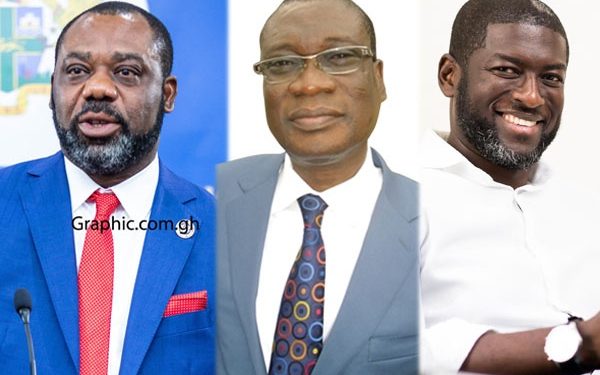Insiders, have been left asking who is benefiting from the tussle between ENI/Vitol and Springfield; in the unitisation stubbornness?
The energy sector now is said to be suffering from lack of investment, as many companies are afraid of the Akufo-Addo government’s attempt to eat into their interests.
ENI, had wanted to put up its regional headquarters in Accra, but it is currently in the boardroom weighing that decision against the juicy offers Ivory Coast is offering it to come there, following the discovery made in that country recently, while its interest in Ghana is being frustrated by self-seeking elements in the Akufo-Addo government.
Ghana filed its response to the lawsuit against it in the unitisation case between ENI/Vitol and Springfield, but in a seemingly adamant posture, the energy sector trio; Gabby Asare Okyere-Darko, the Energy Minister, Dr. Mathew Opoku Prempe alias “NAPO” and the Chief Executive of Ghana National Petroleum (GNPC), Kofi Koduah Sarpong, hope to try their luck at Ghana’s expense in a case that industry expects deem technical, rather than legal.
Insiders tell The Herald that in all of these, the GNPC boss, KK Sarpong, appears the most confused.
While, he deployed his engineers to produce a lackluster report to justify unitisation, he has repeatedly downplayed the viability of the Springfield’s discovery on radio and TV interviews on the decision to acquire Aker Energy for unreasonably high price. It appears he is betting against Aker now rather than risking it for Springfield.
Over the past two years, the government of Ghana has taken a hardline on the powers of the Minister of Energy to determine whether adjoining oil fields can go into unitization for optimal exploitation of petroleum resources.
Section 34 (1) of the Petroleum Exploration and Production Act, Act 919, states: “Where an accumulation of petroleum extends beyond the boundaries of one contract area into one or more other contract areas, the Minister in consultation with the Commission may, for the purpose of ensuring optimum recovery of petroleum from the accumulation of petroleum, direct the relevant contractors, to enter into an agreement to develop and produce the accumulation of petroleum as a single unit”.
In a direct reference to this provision, the then Minister of Energy, John Peter Amewu issued a directive in 2020 for the unitization of ENI OCTP field and Kelvin Okyere’s Springfield’s Afina discovery on the advice of GNPC despite the troubles of Springfield.
This has been contested by industry players and ENI/Vitol as heavy handed and lacks the scientific basis for that determination. Consequently, the parties have been in court litigating instead of exploring the industry practices that could give meaning to the legal provisions in Act 919.
In a recent attempt to overturn the decision of the minister through a judicial review, the court presided over by Justice Emmanuel Kwesi Mensah threw out the case of ENI on purely technical grounds, deeming the application led by the legal firm of Ace Ankomah as incompetent.
Some lawyers The Herald spoke to on the ruling of the court suggest that the errors in the filing are too basic to be genuine. This has brought to the spotlight the proximity of Ace Akomah to the corridors of power and Gabby Otchere-Darko, who insiders say are the key Architects of the unitization drama.
To some, it was perhaps a difficult choice for Ace; either to serve the interest of his client or political masters who bring major transactions, such as Agyapa, to his firm at least effort. It appears ENI was sacrificed for the latter option.
It is not surprising though, as Napo has consistently told the Italians and Vitol that they’ll lose every case in Ghana. True to his words, things are working as planned. ENI has already lost two court decisions; one that asked the Italian company to escrow about thirty percent of revenue from the OCTP fields and another that threw out the review application lousily filed by Ace Ankomah’s law firm.
In a recent interview with Joy FM the preferred deputy minister of Napo, Andrew Egyapa Mercer, told the media outlet that the government will win the arbitration case as well. Perhaps he feels the arbitral tribunal is an extension of the local courts and the lawyers will be the same.
It is almost certain that Gabby’s legal fronts in the Ghanaian space, White and Case, will be representing the government and GNPC. In that case, win or lose, Gabby benefits. Some of these considerations are weighing heavily on any counter advice for the government to reflect the consequences of litigation on the oil industry.
As a result, the technical solution, which experts say would take less than a month to deliver, has been side-lined in favour of what appears a grand political agenda to tap into the US$7 billion OCTP investment, which has already taken two years.
Experts tell The Herald that the oil industry is yearning for sober reflection to project Ghana’s interest above pettiness, ego and schemes to undermine accountability.
“The industry is suffering from lack of investment and production decline. The prudent effort of the government should be about a fair investment regime, not defence of laziness and unbridled greed which is plaguing the industry”.
The Herald, in the meantime, is monitoring the activities of some people in the government who are cooking another questionable scheme to be called “Jubilee oil Holdings”, and will be reporting on it soon.
Meanwhile, the online news portal Africa Intelligence has given details on the court case that “Sankofa operator ENI fails in bid to split with Springfield’s Afina”.
In a publication last week dated 29/10/2021, “a Ghanaian court has denied the Italian major any opportunity to contest the decision to unitise its Sankofa oilfield with Afina”.
It said “on 21 October, the Italian major ENI and its partner Vitol once again failed to annul an order to unitise their Sankofa field with Springfield Energy’s Afina. The two international oil companies had asked the high court of Accra to re-examine the legality of the energy ministry’s order to unitise the two fields. The government is seeking to have a sole operator for a single deposit split across several blocks.
ENI has been in production at Sankofa, located on the Offshore Cape Three points (OCTP) block, since 2017. It is reluctant to unitise the field with local firm Springfield, which has only drilled one exploration well on Afina, located on the block adjacent to OCTP, West Cape Three Points 2.
Springfield is run by Kevin Okyere, a man close to the presidential family, his wife being the niece of first lady Rebecca Akufo-Addo.
Lengthy proceedings
In principle, the judicial review would be able to question the legality of the ministerial order without the court taking a decision on the substance. Here, ENI and Vitol had asked the court to recognise the illegal nature of the unitisation order, which they felt to be “arbitrary, unfair and unreasonable”.
But the 115 arguments ENI and Vitol submitted to the court fell short of their mark. Judge Emmanuel Kwesi Mensah rejected their request on procedural grounds. In his ruling, which Africa Intelligence has seen, Mensah indicates that ENI and Vitol should only have submitted their requests for reparation in an affidavit.
The two oil firms however had also mentioned these elements in a motion paper. The court has been particularly unforgiving over the matter of form and also esteems that the title of the request was not entirely suitable. It goes on to state that ENI and Vitol’s lawyer NaniaOwusu-Ankomah from the Ghanaian firm Bentsi-EnchillLetsa&Ankomah, who presented herself as ENI’s legal manager, did not provide enough detail about her relationship with Vitol.
ENI up against the Ghanaian courts
ENI and Vitol have been ordered to pay 10,000 cedi (roughly €1,400) in legal costs to Springfield Energy and the Ministry of Justice. Lawyer AdwoaObeng represented the ministry, for whom he works, and Springfield, the interested party, was defended by Nana Boakye Mensah-Bonsu from Sory@law.
So far, the Ghanaian courts have been particularly harsh on ENI. The major had already been ordered on 23 June to deposit into an escrow account 30percent of its revenue from Sankofa, which produces 60,000 bpd (AI, 05/07/21). ENI has not complied with this ruling and has decided to sue Ghana at the London Court of Arbitration over this matter.










Discussion about this post